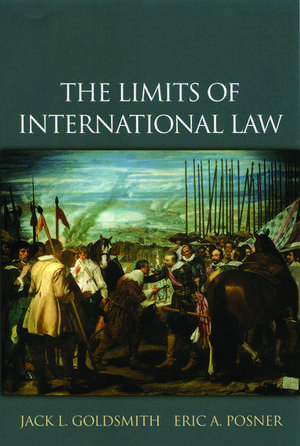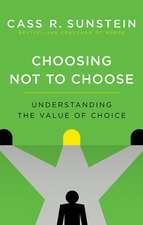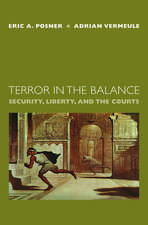The Limits of International Law: The Limits of International Law: The Limits of International Law
Autor Jack L. Goldsmith, Eric A. Posneren Limba Engleză Paperback – 29 mar 2007
Preț: 173.44 lei
Preț vechi: 188.76 lei
-8% Nou
Puncte Express: 260
Preț estimativ în valută:
33.20€ • 34.21$ • 28.03£
33.20€ • 34.21$ • 28.03£
Carte tipărită la comandă
Livrare economică 20-26 februarie
Preluare comenzi: 021 569.72.76
Specificații
ISBN-13: 9780195314175
ISBN-10: 0195314174
Pagini: 272
Dimensiuni: 233 x 161 x 18 mm
Greutate: 0.4 kg
Editura: Oxford University Press
Colecția OUP USA
Seria The Limits of International Law
Locul publicării:New York, United States
ISBN-10: 0195314174
Pagini: 272
Dimensiuni: 233 x 161 x 18 mm
Greutate: 0.4 kg
Editura: Oxford University Press
Colecția OUP USA
Seria The Limits of International Law
Locul publicării:New York, United States
Recenzii
"refreshing and timely"--The Weekly Standard
"...a valuable contribution to international relations and a useful book for lawmakers and laymen alike."--The Weekly Standard
"Scholars have long debated why and when states comply with international law; one widely held view is that states do so out of a sense of moral obligation or a desire for legitimacy. This elegantly argued book... offers a simpler and more instrumental explanation: states agree to and follow international law only when it is in their national self-interest."--Foreign Affairs
"Jack L. Goldsmith and Eric A. Posner boldly and ambitiously set out to answer a host of traditional questions posed by critics and advocates of international law.... As the central theme, the single most distinctive character of the book is the employment of rational choice theory as it relates to international law.... The creativity displayed here should now whet the appetite of other legal scholars to approach the international law and politics relationship from the perpsective of prospect theory, or pursuing policy on the fear of losing an objective."--The Law and Politics Book Review
"[B]oldly and ambitiously set[s] out to answer a host of traditional questions posed by critics and advocates of international law."--Law and Politics Book Review
"How much effect does international law actually have on how nations behave? Goldsmith and Posner ask trenchant questions and offer thought-provoking answers in a pioneering effort to address that question through the prism of rational choice theory. There will be a long and vigorous debate about the utility of their approach. Agree with them or not, their boldness and innovation provide a welcome effort at injecting greater analytic rigor into international law scholarship."--Michael J. Glennon, Fletcher School of Law & Diplomacy, Tufts University
"At a time of rising interest in the intersection of international law and international relations scholarship, Goldsmith and Posner throw down a gauntlet likely to infuriate many traditional international lawyers. Their insistence that international legal obligations are equal part coincidence and rational state self-interest, nothing more, demands and will certainly get an answer. Equally important is their claim to be the heirs of Kennan and Morgenthau in cautioning against the perils of what they perceive to be a new round of legalism-moralism. They have thus raised the political as much as the methodological stakes in what is likely to be a heated and timely debate."--Anne-Marie Slaughter, Dean, Woodrow Wilson School of Public and International Affairs, Princeton University
"Jack Goldsmith and Eric Posner have written a compelling study which provides an elegant analytic framework for understanding when international law matters and when it does not. Goldsmith and Posner show that some kinds of international law are very consequential while others are not. After this study it will be difficult for any serious observer to treat customary international law as if it were a constraint on rather than an manifestation of changing state power and preferences."--Stephen D. Krasner, Department of Political Science, Stanford University
"...a valuable contribution to international relations and a useful book for lawmakers and laymen alike."--The Weekly Standard
"Scholars have long debated why and when states comply with international law; one widely held view is that states do so out of a sense of moral obligation or a desire for legitimacy. This elegantly argued book... offers a simpler and more instrumental explanation: states agree to and follow international law only when it is in their national self-interest."--Foreign Affairs
"Jack L. Goldsmith and Eric A. Posner boldly and ambitiously set out to answer a host of traditional questions posed by critics and advocates of international law.... As the central theme, the single most distinctive character of the book is the employment of rational choice theory as it relates to international law.... The creativity displayed here should now whet the appetite of other legal scholars to approach the international law and politics relationship from the perpsective of prospect theory, or pursuing policy on the fear of losing an objective."--The Law and Politics Book Review
"[B]oldly and ambitiously set[s] out to answer a host of traditional questions posed by critics and advocates of international law."--Law and Politics Book Review
"How much effect does international law actually have on how nations behave? Goldsmith and Posner ask trenchant questions and offer thought-provoking answers in a pioneering effort to address that question through the prism of rational choice theory. There will be a long and vigorous debate about the utility of their approach. Agree with them or not, their boldness and innovation provide a welcome effort at injecting greater analytic rigor into international law scholarship."--Michael J. Glennon, Fletcher School of Law & Diplomacy, Tufts University
"At a time of rising interest in the intersection of international law and international relations scholarship, Goldsmith and Posner throw down a gauntlet likely to infuriate many traditional international lawyers. Their insistence that international legal obligations are equal part coincidence and rational state self-interest, nothing more, demands and will certainly get an answer. Equally important is their claim to be the heirs of Kennan and Morgenthau in cautioning against the perils of what they perceive to be a new round of legalism-moralism. They have thus raised the political as much as the methodological stakes in what is likely to be a heated and timely debate."--Anne-Marie Slaughter, Dean, Woodrow Wilson School of Public and International Affairs, Princeton University
"Jack Goldsmith and Eric Posner have written a compelling study which provides an elegant analytic framework for understanding when international law matters and when it does not. Goldsmith and Posner show that some kinds of international law are very consequential while others are not. After this study it will be difficult for any serious observer to treat customary international law as if it were a constraint on rather than an manifestation of changing state power and preferences."--Stephen D. Krasner, Department of Political Science, Stanford University
Notă biografică
Jack L. Goldsmith is Henry L. Shattuck Professor of Law, Harvard University. He is co-author of Who Controls the Internet? and the casebooks Foreign Relations Law and Conflicts of Laws. Eric A. Posner is Kirkland & Ellis Professor of Law, University of Chicago. He is the co-author of Terror in the Balance and the editor of the Journal of Legal Studies.






















